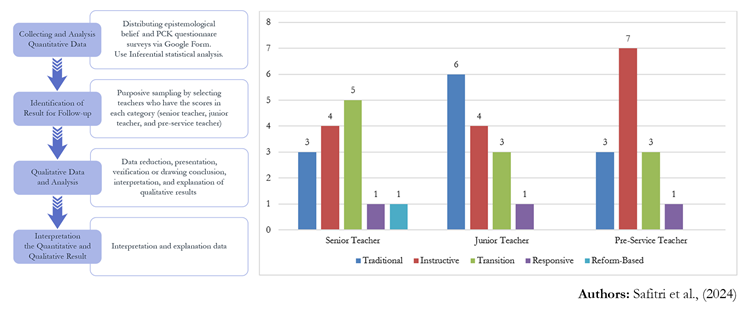
An Exploration of Secondary School Science Teacher’s Epistemological Belief in Malang
Abstract
The objective of this study is to delve into the epistemological convictions of secondary school science teachers in Malang across various tenures, namely senior teachers, junior teachers, and pre-service teachers. Employing an explanatory sequential design model, the research employs a mixed-method approach. Quantitative data, gathered through the administration of the Scientific Epistemology Beliefs Questionnaire (n = 30), are complemented by qualitative insights drawn from interviews with teachers (n = 6) concerning their epistemological orientations. Descriptive statistics and qualitative analyses, utilizing an a priori coding technique aligned with the study’s conceptual framework, were conducted on the interview data. Quantitative analysis reveals a parity in the level of epistemological beliefs among teachers. However, qualitative examination unveils nuanced distinctions: senior teachers demonstrate transitional epistemological beliefs, while junior teachers and pre-service teachers exhibit traditional and instructive orientations, respectively. These findings hold significance for the enhancement of teachers’ professional development in Malang, particularly in the domain of science pedagogy.
Keywords
Full Text:
PDFReferences
Bayraktar, S. (2019). Pre-service primary school teachers’ scientific epistemological beliefs and attitudes toward science: Is there a relationship?. World Journal of Education, 9(6), 83–97. https://doi.org/10.5430/wje.v9n6p83
Çarkit, C., & Kurnaz, H. (2022). The relationship between preservice teachers’ critical thinking and epistemological beliefs. International Journal of Progressive Education, 18(1), 114–127. https://doi.org/10.29329/ijpe.2022.426.7
Chai, C. S. (2010). Teachers’ epistemic beliefs and their pedagogical beliefs: A qualitative case study among singaporean teachers in the context of ICT-supported reforms. Turkish Online Journal of Educational Technology-TOJET, 9(4), 128–139.
Chan, K. W., & Elliott, R. G. (2004). Relational analysis of personal epistemology and conceptions about teaching and learning. Teaching and Teacher Education, 20(8), 817–831. https://doi.org/10.1016/j.tate.2004.09.002
Creswell, J. W., & Clark, V. L. P. (2017). Designing and conducting mixed methods research (3rd ed.). Thousand Oaks, CA: SAGE Publications, Inc.
Docktor, J. L., & Mestre, J. P. (2014). Synthesis of discipline-based education research in physics. Physical Review Special Topics-Physics Education Research, 10(2), 020119. https://doi.org/10.1103/PhysRevSTPER.10.020119
Fang, Z. (1996). A review of research on teacher beliefs and practices. Educational Research, 38(1), 47–65. https://doi.org/10.1080/0013188960380104
Fayakun, M., & Joko, P. (2015). Efektivitas pembelajaran fisika menggunakan model kontekstual (CTL) dengan metode predict, observe, explain terhadap kemampuan berpikir tingkat tinggi. Jurnal Pendidikan Fisika Indonesia, 11(1), 49–58. https://doi.org/10.15294/jpfi.v11i1.4003
Grecic, D. (2015). Back to front coach learning-reflections on the final study: Epistemological chaining across the talent pathway. Journal of Qualitative Research in Sports Studies, 9(1), 235–256.
Jumrawarsi, J., & Suhaili, N. (2020). Peran seorang guru dalam menciptakan lingkungan belajar yang kondusif. Ensiklopedia Education Review, 2(3), 50–54. https://doi.org/10.33559/eer.v2i3.628
Kim, H. J., & Im, S. (2021). Pre-service physics teachers’ beliefs about learning physics and their learning achievement in physics. Asia-Pacific Science Education, 7(2), 500–521. https://doi.org/10.1163/23641177-bja10038
Kirmizi, Ö., & Irgatoğlu, A. (2021). An investigation of the relation between pre-service EFL teachers’ epistemological cognition and teaching approaches. Manisa Celal Bayar Üniversitesi Sosyal Bilimler Dergisi, 19(2), 217–232. https://doi.org/10.18026/cbayarsos.874649
Kirmizigul, A. S., & Bektas, O. (2019). Investigation pre-service teachers’ epistemological beliefs. Cypriot Journal of Educational Sciences, 14(1), 146-157. https://doi.org/10.18844/cjes.v14i1.3759
Koutsianou, A., & Emvalotis, A. (2021). Unravelling the interplay of primary school teachers’ topic-specific epistemic beliefs and their conceptions of inquiry-based learning in history and science. Frontline Learning Research, 9(4), 35–75. https://doi.org/10.14786/flr.v9i4.777
Kutluca, A. Y., & Mercan, N. (2022). Exploring the effects of preschool teachers’ epistemological beliefs on content-based pedagogical conceptualizations and PCK integrations towards science teaching. European Journal of Science and Mathematics Education, 10(2), 170–193. https://doi.org/10.30935/scimath/11661
Luft, J. A., & Roehrig, G. H. (2007). Capturing science teachers’ epistemological beliefs: The development of the teacher beliefs interview. Electronic Journal of Science Education, 11(2), 38–63.
Martin, A., Park, S., & Hand, B. (2019). What happens when a teacher’s science belief structure is in disequilibrium? Entangled nature of beliefs and practice. Research in Science Education, 49, 885–920. https://doi.org/10.1007/s11165-017-9644-0
Maulani, M., Kurniawan, D. A., & Jumiarti, H. (2021). Identifikasi kemampuan analisis siswa dengan menerapkan model pembelajaran berpusat pada guru (teacher center learning) pada mata pelajaran fisika di SMA N 1 Lubuk Sikaping. In R. R. Cahyani et al. (Eds.), Implementasi hasil riset dan pengabdian perguruan tinggi menuju Indonesia tangguh, Indonesia tumbuh. Proceedings of the 1st Seminar Nasional Hasil Riset dan Pengabdian (SENRIABDI) (pp. 143–150). Universitas Sahid Surakarta, Surakarta, Indonesia. Retrieved from https://www.jurnal.usahidsolo.ac.id/index.php/SENRIABDI/ article/view/848
Mularsih, H., & Hartini, H. (2019). Pengelolaan ruang kelas dalam rangka meningkatan keefektifan pembelajaran di PKBM Insan Cendikia. In T. Fatimah et al. (Eds.), Peran perguruan tinggi dalam mempersiapkan masyarakat menghadapi era industri 4.0. Proceedings of the Seminar Nasional Hasil Penelitian dan Pengabdian Kepada Masyarakat (SENAPEMAS) 2018 (pp. 415–421). Universitas Tarumanegara, Jakarta, Indonesia. Retrieved from https://lintar.untar.ac.id/repository/pengabdian/buktiabdi_10695015_13E170506.pdf
Munawir, M., Salsabila, Z. P., & Nisa, N. R. (2022). Tugas, fungsi dan peran guru profesional. Jurnal Ilmiah Profesi Pendidikan, 7(1), 8–12. https://doi.org/10.29303/jipp.v7i1.327
Muslimin, M. (2020). Program penilaian kinerja guru dan uji kompetensi guru dalam meningkatkan prestasi kerja guru. Indonesian Journal of Education Management & Administration Review, 4(1), 193–200. http://dx.doi.org/10.4321/ijemar.v4i1.4384
Nacaroglu, O., & Kizkapan, O. (2021). Gifted students' beliefs about knowledge and learning. Journal of Science Learning, 4(3), 275–287. https://doi.org/10.17509/jsl.v4i3.31995
Önal, N. T., & Kirmizigül, A. S. (2021). Investigation of the preservice teachers’ science-pseudoscience distinction and epistemological beliefs. Journal of Pedagogical Research, 5(3), 55–67. https://doi.org/10.33902/jpr.2021370582
Öztürk, Y. A. (2022). An analysis of the relationship between pre-service secondary mathematics teachers’ epistemological beliefs towards learning, their educational beliefs, and critical thinking dispositions. Educational Policy Analysis and Strategic Research, 17(2), 165–207. https://doi.org/10.29329/epasr.2022.442.8
Peña-Ayala, A. (2021). A learning design cooperative framework to instill 21st century education. Telematics and Informatics, 62, 101632. https://doi.org/10.1016/j.tele.2021.101632
Perkins, K. K., Adams, W. K., Pollock, S. J., Finkelstein, N. D., & Wieman, C. E. (2005). Correlating student beliefs with student learning using the Colorado learning attitudes about science survey. AIP Conference Proceedings, 790(1), 61–64. https://doi.org/10.1063/1.2084701
Pratiwi, C. H., Anwar, Y., & Slamet, A. (2017). Analisis kemampuan PCK (pedagogical content knowledge) guru mata pelajaran biologi SMA di Kecamatan Babat Toman. Jurnal Pembelajaran Biologi: Kajian Biologi Dan Pembelajarannya, 4(2), 152–170. https://doi.org/10.36706/fpbio.v4i2.7120
Prijanto, J. H., & De Kock, F. (2021). Peran guru dalam upaya meningkatkan keaktifan siswa dengan menerapkan metode tanya jawab pada pembelajaran online. Scholaria: Jurnal Pendidikan Dan Kebudayaan, 11(3), 238–251.
Rahmawati, F., & Atmojo, I. R. W. (2021). Analisis media digital video pembelajaran abad 21 menggunakan aplikasi Canva pada pembelajaran IPA. Jurnal Basicedu, 5(6), 6271–6279. https://doi.org/10.31004/basicedu.v5i6.1717
Reichert, F., Lange, D., & Chow, L. (2021). Educational beliefs matter for classroom instruction: A comparative analysis of teachers’ beliefs about the aims of civic education. Teaching and Teacher Education, 98, 103248. https://doi.org/10.1016/j.tate.2020.103248
Sabaniah, S., Ramdhan, D. F., & Rohmah, S. K. (2021). Peran guru dalam pelaksanaan pembelajaran jarak jauh di tengah wabah Covid-19. Edunesia: Jurnal Ilmiah Pendidikan, 2(1), 43–54. https://doi.org/10.51276/edu.v2i1.77
Safira, S., Bahrun, B., & Fauzia, S. N. (2021). Analisis penerapan metode tanya jawab dalam perkembangan bahasa anak. Jurnal Ilmiah Mahasiswa Pendidikan Anak Usia Dini, 6(1), 11–20.
Sappaile, N. (2017). Pengaruh kompetensi pedagogik, kompetensi profesional, dan sikap profesi guru tehadap kinerja penilaian guru di sekolah dasar. JTP-Jurnal Teknologi Pendidikan, 19(1), 66–81. https://doi.org/10.21009/jtp.v19i1.5334
Sari, Y. E., Sugiyanti, S., & Muhtarom, M. (2019). Analisis epistemology belief guru SMP terhadap matematika yang berjenis kelamin perempuan dan memiliki pengalaman mengajar lebih dari 15 tahun. Imajiner: Jurnal Matematika dan Pendidikan Matematika, 1(5), 72–84. https://doi.org/10.26877/imajiner.v1i5.4406
Schommer, M. (1990). Effects of beliefs about the nature of knowledge on comprehension. Journal of educational psychology, 82(3), 498–504. https://doi.org/10.1037/0022-0663.82.3.498
Sebayang, F. A. A., & Silalahi, M. (2018). Keyakinan epistemologis dan konsep belajar mengajar mahasiswa pendidikan guru anak usia dini Universitas Negeri Medan. Jurnal Usia Dini, 4(2), 18–30. https://doi.org/10.24114/jud.v4i2.12100
Subiantoro, A. W. (2010). Pentingnya praktikum dalam pembelajaran IPA. Paper presented at the Pelatihan Pengembangan Praktikum IPA Berbasis Lingkungan, Yogyakarta, Indonesia. Retrieved from https://staffnew.uny.ac.id/upload/132309690/pengabdian/PPM_PENTINGNYA+PRAKTIKUM.pdf
Sudirman, S., Sarjan, M., Rokhmat, J., Hamidi, H., Muliadi, A., Azizi, A., ... & Rahmatiah, R. (2022). Praktik penilaian guru pendidikan sains antara keyakinan atau pengetahuan guru? Perspektif filsafat. Jurnal Ilmiah Profesi Pendidikan, 7(3c), 2018–2025. https://doi.org/10.29303/jipp.v7i3c.889
Sugrah, N. (2019). Implementasi teori belajar konstruktivisme dalam pembelajaran sains. Humanika, Kajian Ilmiah Mata Kuliah Umum, 19(2), 121–138. http://dx.doi.org/10.21831/hum.v19i2.29274
Sulistiyono, S., Mundilarto, M., & Kuswanto, H. (2019). Pengembangan instrumen penilaian kerja laboratorium fisika untuk mengukur sikap dan tanggung jawab siswa. Jurnal Materi dan Pembelajaran Fisika, 9(1), 43–49. https://doi.org/10.20961/jmpf.v9i1.31620
Supriyati, I. (2020). Penerapan metode diskusi dalam pembelajaran keterampilan berbicara pada siswa kelas VIII MTSN 4 Palu. Jurnal Bahasa dan Sastra, 5(1), 104–116.
Suryandari, K. C., Rokhmaniyah, R., & Wahyudi, W. (2021). The effect of scientific reading based project model in empowering creative thinking skills of preservice teacher in elementary school. European Journal of Educational Research, 10(3), 1329–1340. https://doi.org/10.12973/EU-JER.10.3.1329
Jurnal Pendidikan Sains Journal of Science, Mathematics, and Vocational Education Graduate School Of Universitas Negeri Malang JPS is licensed under Creative Commons Attribution-ShareAlike 4.0 International License |






